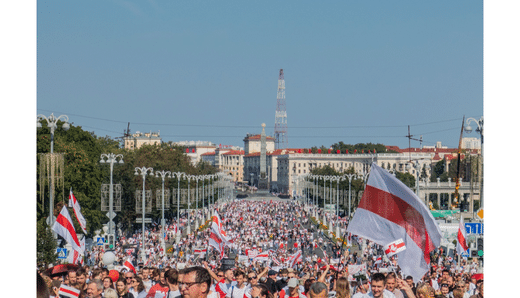Protests against the Belarusian regime, Minsk, August 2020 (WikiMedia Commons)
Last Friday, 16 September, the annual four trees commemoration took place again in Eindhoven. This commemoration commemorates four opposition members who disappeared in Belarus in 1999 and 2000. Today, it is still unknown what happened to Anatoly Krasovsky, Viktor Gonchar, Yuri Zakharenko and Dmitry Zavadsky. Although this took place more than two decades ago, the commemoration remains unchanged. The Lukashenka regime's repression of political opposition of all kinds continues unabated and has intensified greatly after the fraudulent 2020 elections, subsequent protests, and the Russian invasion of Ukraine. The dire situation of political activists in Belarus therefore continues to demand our attention.
Four disappearances
On 16 September 1999, businessman Anatoly Krasovsky and opposition leader Viktor Gonchar left a bathhouse in Minsk. After this, they were never seen again. On a similar mysterious note, former foreign minister Yuri Zakharenko disappeared on 7 May 1999, and journalist Dmitry Zavadsky on 7 July 2000. All were leading critics of the dictatorial regime of Aleksandr Lukashenka, who has held sway in Belarus since 1994.
Despite highly incriminating evidence from a Belarusian ex-policeman in 2019, who said he helped in the state-sponsored disappearances, the Belarusian authorities never cooperated in a credible investigation into the disappearances. This makes these politically motivated disappearances symbolic of the repression and horrors under the Lukashenka regime.
Unabatedly topical
A regime that deems such repression necessary to consolidate power fears its people. For the Belarusian people, it was enough in 2020, after another rigged election that secured Lukashenka a new term. Large-scale protests in the country have since maximised repression by Lukashenka - backed by the Kremlin in the process. Belarus has neighbouring Russia as its only ally in Europe. This became apparent when the Belarusian regime decided to support Russia's invasion of Ukraine, by making the south of the country available for a large-scale attack on Kyiv.
Repression against members of the Belarusian opposition is now complete. Politicians, businessmen, artists, trade unionists, journalists, anti-war activists, and others who do not align with the Belarusian regime are on the run, or facing years of imprisonment. The most prominent opposition leader Sviatlana Tsikhanouskaya had to seek exile in Lithuania after she replaced already imprisoned partner Sergei Tikhanovsky in the 2020 elections. Meanwhile, Tikhanovsky, like most presidential candidates, is serving a 15-year prison sentence in Belarus. The lawlessness of the Lukashenka regime was once again evident in May 2021, when it allowed RyanAir flight 4978 to land in Minsk under a false bomb threat just so it could arrest political opponent Roman Protasevich and his girlfriend Sofia Sapega. Protasevich is still awaiting trial, Sapega has six years' imprisonment received in May 2022.
With the war in Ukraine has come the realisation that democracy and freedom is not a given fact in Europe. This is also true for Belarus - for the justice of all those who have been oppressed by the Lukashenka regime for almost three decades.
In Eindhoven, which maintained a city tie with Minsk until 2012, past and present meet at the four trees commemorating Anatoly Krasovsky, Viktor Gonchar, Yuri Zakharenko and Dmitry Zavadsky. However, the repression of Lukashenka and his regime continues unabated, as do Belarusian opposition parties that continue to address the injustices in Belarus in international politics. It is up to Europe to continue to draw attention to this so that those responsible for these gross human rights violations can be held accountable.
More information on the commemorations, the missing men, and Belarus can be found at www.vierbomen.nl.
Vierbomen.nl is a partnership of Amnesty International, FNV, We Remember, and Mission-to-Minsk.
Sources: Euronews; Deutsche Welle
Photo: WikiMedia Commons





